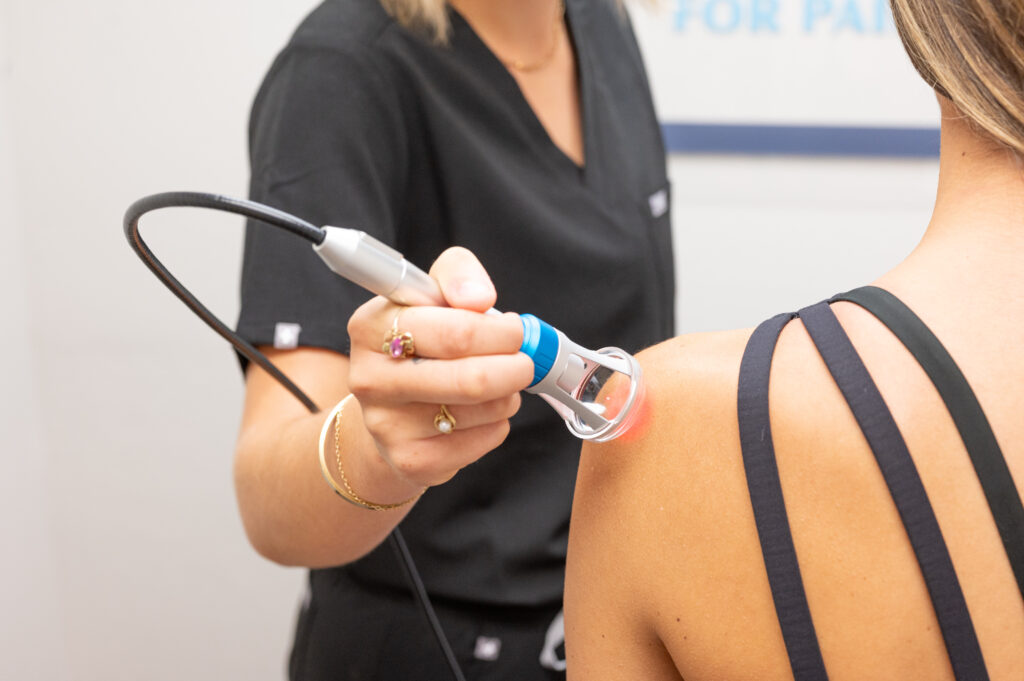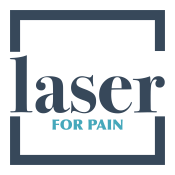Shoulder pain is a common ailment that can affect people of all ages and backgrounds. Whether it’s the result of an injury, overuse, or a chronic condition, living with persistent shoulder pain can be debilitating and affect one’s quality of life. If you want that bag of chips off the top shelf, you want to be able to reach up and grab it! Fortunately, modern advancements in medical technology have introduced an innovative treatment option – laser therapy – that offers hope to those suffering from shoulder pain.

Understanding Shoulder Pain
The shoulder is one of the most complex and mobile joints in the body, allowing us to perform a wide range of movements. However, this versatility also makes the shoulder susceptible to various injuries and conditions. In school you learn about mobility and stability and how consequently, the more mobility you have the less stability; the case being with the shoulder joint. Common causes of shoulder pain include:
- Rotator Cuff Injuries: These are tears or strains in the group of muscles and tendons that stabilize the shoulder joint. They are small and mighty, but are commonly injured.
- Tendonitis: Inflammation of the tendons due to overuse or injury can lead to painful conditions like bursitis and tendinitis.
- Frozen Shoulder: Also known as adhesive capsulitis, this condition restricts shoulder movement due to the thickening and tightening of the joint capsule.
- Arthritis: Osteoarthritis and rheumatoid arthritis can affect the shoulder joint, leading to pain and reduced mobility.
- Nerve Compression: Conditions like thoracic outlet syndrome or a pinched nerve can cause radiating shoulder pain.

Laser Therapy: Shedding Light on Shoulder Pain Relief
Laser therapy, also known as photobiomodulation (PBM), is a non-invasive medical treatment that utilizes specific wavelengths of light to stimulate cellular processes and reduce pain and inflammation. In the case of shoulder pain, laser therapy can be a game-changer. Here’s how it works:
When low-level laser light is applied to the affected area, it penetrates the skin and reaches the underlying tissues. This light energy is absorbed by cellular structures, particularly the mitochondria, where it stimulates the production of adenosine triphosphate (ATP). ATP is a vital molecule that fuels cellular activities, including the repair and regeneration of damaged tissues. If there are damaged tissues within the shoulder causing pain, the laser can effectively target those and promote healing mechanisms. Additionally, laser therapy promotes the release of anti-inflammatory cytokines and increases blood flow to the targeted area. These combined effects reduce inflammation, alleviate muscle spasms, and promote the body’s natural healing processes. For conditions like bursitis, tendonitis, and arthritis, inflammation can be a large part of what causes pain; therefore, the laser aids! As a result, patients experience a noticeable reduction in pain and improved overall comfort, often without the need for pharmaceuticals or invasive treatments.
Effectiveness of Laser Therapy
Numerous clinical studies and patient testimonials have demonstrated the effectiveness of laser therapy in relieving shoulder pain. Many patients have and are experiencing significant pain reduction and improved range of motion after a series of treatment sessions.
However, it’s essential to consult with a healthcare professional before starting laser therapy, as individual results may vary depending on the underlying cause and severity of the shoulder pain.
Recap!
Shoulder pain can be a debilitating condition that affects one’s quality of life. Laser therapy offers a promising and non-invasive solution for those seeking relief from shoulder pain caused by various injuries and conditions. With its ability to stimulate cellular repair, reduce inflammation, and improve blood flow, laser therapy has become a ray of hope for individuals looking to regain their shoulder mobility and alleviate their discomfort. If you’re suffering from shoulder pain, consider exploring the potential benefits of laser therapy in consultation with a qualified healthcare provider. If you would like to hear more or schedule an appointment with on of our highly trained and certified laser providers, click here!
